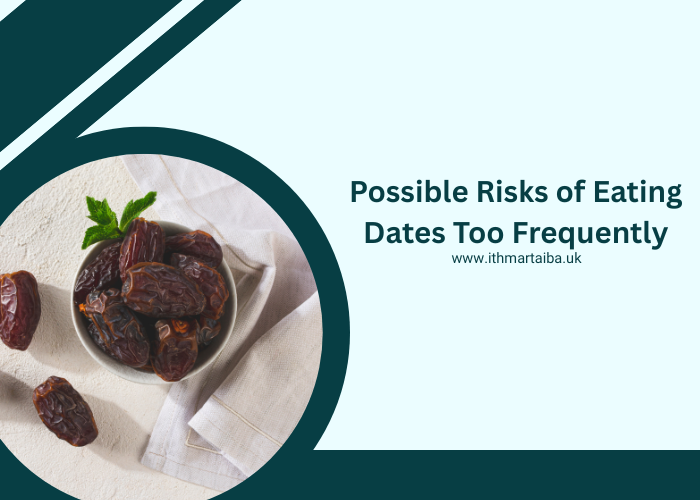No products in the cart.
“Pure, Natural, and Delicious — Dates You Can Trust.”

Possible Risks of Eating Dates Too Frequently: What You Need to Know
Dates have been cherished for thousands of years as one of nature’s sweetest treasures. From Middle Eastern traditions to modern superfood trends, they’ve become a favorite worldwide for their chewy texture, rich caramel-like flavor, and nutrient-packed profile. Loaded with antioxidants, fiber, and essential minerals, they are often hailed as one of the healthiest dried fruits available. But here’s the catch: even healthy foods come with limits. While dates are a nutritional powerhouse, eating them without moderation can lead to unexpected side effects. That’s why understanding the possible risks of eating dates too frequently is essential for maintaining balance and avoiding health pitfalls.
In this detailed guide, we’ll explore these risks, provide useful tips to consume dates wisely, and answer the most common questions people have about dates.
Sugar Overload: A Common Risk of Eating Dates Too Frequently
One of the main possible risks of eating dates too frequently is sugar overload. Dates are naturally high in sugars—about 60–70% of their weight comes from glucose, fructose, and sucrose.
While these are natural sugars and far healthier than refined white sugar, too much of them can still cause spikes in blood sugar levels. This is particularly concerning for people with diabetes, insulin resistance, or those trying to manage weight.
Even though dates have a relatively low glycemic index compared to processed sugar, overeating them can strain the pancreas and impact insulin regulation.
👉 Smart tip: Stick to 2–4 dates a day and pair them with protein or healthy fats like nuts, seeds, or yogurt to help balance sugar absorption.
Digestive Discomfort from Excess Fiber
Fiber is one of the most celebrated nutrients in dates. A 100-gram serving delivers around 7 grams of fiber, which supports digestion, prevents constipation, and nourishes gut health.
But here’s the flip side: suddenly consuming too many dates can overwhelm your digestive system. The result? Bloating, stomach cramps, constipation, or even diarrhea. People who aren’t used to high-fiber diets are especially vulnerable.
👉 Smart tip: Introduce dates gradually and drink enough water throughout the day to support smooth digestion.
Possible Risks of Eating Dates Too Frequently: Weight Gain
Another one of the possible risks of eating dates too frequently is unexpected weight gain. Dates are nutrient-dense but also calorie-dense. Just 100 grams packs about 277 calories, and a single Medjool date contains around 66 calories.
Because of their small size and addictive sweetness, it’s easy to underestimate portions. What feels like a handful can easily add up to several hundred calories. Over time, this can contribute to gradual weight gain if not balanced with activity.
👉 Smart tip: Enjoy dates as an occasional snack, not a constant one. Limit your portion to 2–3 pieces and avoid eating them mindlessly.
Dental Health Concerns
Here’s a lesser-known but important consideration: dental health. Dates are sticky, and their sugars cling to teeth, creating an ideal environment for bacteria to thrive. Left unchecked, this can increase the risk of cavities, tooth decay, and gum problems.
Among the possible risks of eating dates too frequently, dental health issues often go unnoticed but can have lasting effects.
👉 Smart tip: Brush your teeth or rinse your mouth after eating dates. Pairing them with crunchy nuts like almonds helps reduce stickiness too.
Possible Risks of Eating Dates Too Frequently: Mineral Overload
Dates are rich in essential minerals like potassium, magnesium, and copper, which play a vital role in muscle, heart, and nerve health. But too much of a good thing can be harmful.
Excess potassium, for example, can cause hyperkalemia, leading to irregular heartbeats or kidney strain. This is particularly risky for people with kidney problems or those on potassium-regulating medications.
👉 Smart tip: Enjoy the mineral benefits of dates in moderation to avoid imbalance.
Allergic Reactions and Sulfite Sensitivity
Although rare, allergies to dates can happen. Symptoms may include itching, rashes, swelling, or difficulty breathing. Additionally, many commercially packaged dates contain sulfites, used as preservatives. For people sensitive to sulfites, this can trigger headaches, asthma flare-ups, or digestive upset.
👉 Smart tip: Choose organic, preservative-free dates to minimize these risks.
Fructose Intolerance Issues
Another often overlooked point in the possible risks of eating dates too frequently is fructose intolerance. For individuals with hereditary fructose intolerance (HFI) or fructose malabsorption, even small amounts of dates can cause bloating, abdominal pain, or diarrhea.
👉 Smart tip: If you suspect fructose intolerance, consult a healthcare provider before adding dates to your diet.
Possible Risks of Eating Dates Too Frequently: Nutritional Imbalance
Dates provide a concentrated source of sugars and minerals but lack protein and healthy fats. Eating them in excess while neglecting other food groups can lead to nutritional imbalance.
This makes imbalanced nutrition another major factor in the possible risks of eating dates too frequently.
👉 Smart tip: Treat dates as a supplement to a balanced diet, not a replacement for other food groups. Pair them with protein-rich and fiber-rich foods.
Other Hidden Risks of Overeating Dates
Beyond the main health risks, there are a few hidden concerns worth noting:
- Chemical coatings: Some dates are treated with wax or chemicals, which may irritate digestion.
- Mold contamination: Poorly stored dates can develop mold that triggers allergies or asthma.
- Nighttime snacking: Eating dates right before bed can lead to sugar lingering on teeth overnight, raising cavity risks.
How to Enjoy Dates Without Side Effects
The good news? You don’t have to give up dates entirely. With mindful eating, you can enjoy their benefits without worry. Here’s how:
- Stick to 2–4 dates per day depending on your lifestyle.
- Pair dates with nuts, yogurt, or cheese for balanced nutrition.
- Stay hydrated to support fiber digestion.
- Brush or rinse teeth after consumption.
- Choose fresh, organic, preservative-free options.
Store dates properly to prevent spoilage and mold.
Final Thoughts
Dates are truly a natural gift—nutrient-packed, delicious, and versatile. They provide energy, antioxidants, and fiber, making them an excellent part of a healthy diet. But just like any superfood, moderation is the secret. Awareness of the possible risks of eating dates too frequently ensures that you enjoy their benefits without side effects.
By being mindful of portion size and balance, you can savor the sweetness of dates while protecting your overall health.
🌴 Ready to taste the finest, healthiest dates? Explore our premium collection at IthmarTaiba Dates — where tradition, purity, and quality come together in every bite.
FAQs About the Possible Risks of Eating Dates Too Frequently
- How many dates are safe to eat daily?
Most experts recommend 2–4 dates per day as a healthy portion, depending on your calorie needs and activity level. - Can dates raise blood sugar?
Yes, dates can raise blood sugar if consumed in excess. However, eaten in moderation and paired with protein or fats, they have a moderate impact on blood sugar. - Are dates bad for weight loss?
Not necessarily. Dates can be part of a weight-loss plan when consumed in moderation. Overeating them, however, can add extra calories and slow progress. - Do dates cause constipation or diarrhea?
Both can occur if you eat too many at once. Their high fiber can either ease digestion or cause bloating and discomfort if overconsumed. - Are Medjool dates riskier than other varieties?
Medjool dates are larger and higher in calories compared to smaller varieties. This makes portion control even more important with Medjool dates.
Disclaimer: The data for this article is curated from various sources on the internet. We do not take responsibility for the accuracy of this data.


